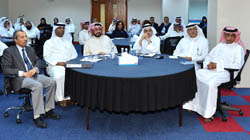

Director General of the Institute of Public Administration (BIPA) and Chairman of the Training Development Committee in Public Sector, HE Dr. Raed Mohammed bin Shams said that in their pursuit of experiments and practices, all countries need to re-assess their training policies and programs to cope with the development and progress witnessed in each and every field. He said the Bahrain government places training at the top of it priorities because of its direct influence on increasing productivity, cutting spending and raising revenues. Training contributes to creating an atmosphere of innovation, invention, excellence and advancement which prevail the administrative and occupational practices and processes. He added that training is the key to any state positive change citing the examples of Singapore, Japan and Scandinavian countries. The Public Sector Training Development Committee held a consultative meeting headed by Dr. Raed Bin Shams and attended by training officials in the public sector and members of the Committee where the government training status quo in the Kingdom of Bahrain was discussed from the perspective of the training officials in the government institutions. The meeting further reviewed the mechanisms of recognizing expenditure and the policies and procedures on which the training sector depends and recommended a variety of visions, ideas and proposals which can serve the training sector. The Public Sector Training Development Committee, recently formed by a decree of Deputy Prime Minister and Vice President of the Civil Service Bureau, HE Shaikh Khalid bin Abdullah Al Khalifa, aims at developing the specialized and administrative training sector, rationalization of government spending on the training sector, organization of training process based on reformulation of the training mechanisms in the government institutions and provision of new mechanisms, which should contribute to form one whole methodology and weigh the training returns to ensure optimum investment of training and increase of relevant outcomes. Bin Shams added that the Committee will determine the relevant expenses of public authorities, set a sustainable mechanism for collecting the financial information related and discuss development mechanisms and options of expenses and financial resources minimization towards the rationalization of government training expenditure by 50% and prevention of negative impacts on the progress of training programs and policies stating that this track will lead to broadening the category of beneficiaries of training programs and setting academic methodologies that can weigh the outcomes of training. Bin Shams highlighted the government interest in supporting the training sector and placing training on the top of all programs and policies priorities indicating the fact that it will assist government and citizens in realizing their aspirations concerning transforming public sector to an advanced stage of administrative work and government performance. He asserted that the positive results of training are the main drive for decision makers and for government to give more care to the training sector to reach a state of creativity and invention. The Public Sector Training Development Committee comprises the Public Works Affairs Undersecretary at the Ministry of Works, Municipalities Affairs and Urban Planning, Ahmed Al-Khayat; CSB's Director General for Human Resources in the Civil Services Bureau, Adel Hiji; CSB's Director General of Organization and Position Budget, Jamal Al-Alawi; MOH's Assistant Undersecretary for Training and Planning, Dr. Mohammed Al-Awadhi; MOE's Assistant Undersecretary for Human Resources, Mohammed Mubarak; BIPA's Executive Director of Learning and Development, Ishaq Al-Kooheji; MOF's Director of Budget Department, Adnan Ishaq; Director of Information Department at His Royal Highness Prime Minister's Court; Ibrahim Al-Tamimi; BIPA's Chief Director of Financial Resources and Public Affairs of Services, Al-Mutassim Billah Ahmed and Research Director at the Office of the First Deputy Prime Minister, Adel Darwish.
